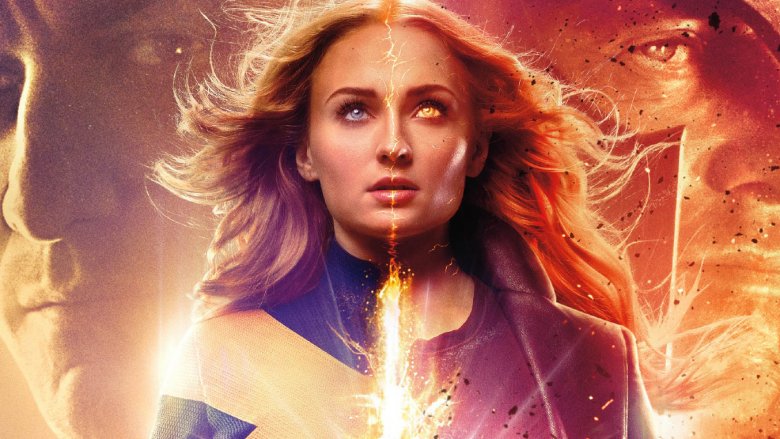The Real Reason The Dark Phoenix Ending Was Changed
Talk about getting beaten to the cosmically-powered punch.
X-Men: Dark Phoenix stars James McAvoy and Michael Fassbender recently sat down with Yahoo! Movies U.K. to discuss the film, and it turns out that the decision to completely rework its third act was due to similarities to another recent superhero flick of note.
While they didn't come right out and say it, McAvoy and Fassbender strongly implied that moving the climactic battle at the conclusion of Dark Phoenix from outer space to a moving train — an expensive and time-consuming endeavor — was done to avoid comparisons with the climax of Captain Marvel, which dropped in March and also happened to feature a female character with godlike powers and a rather specific visual signature.
"The end [of Dark Phoenix] changed a hell of a lot," said McAvoy. "The finale had to change. There was a lot of overlap and parallels with another superhero movie that came out re — a while ago. And we had no idea that we were..."
The star obviously had to bite his tongue to keep from saying the word "recently," and he trailed off upon apparently realizing that he might have already said too much. Fassbender quickly came to his rescue, joking, "[The other production] had spies on set and [they] basically stole our ideas." Har, har, har. Nice save, Michael.
The notion that Captain Marvel was responsible for the reworking is bolstered by comments made by producer/director Simon Kinberg during a conversation with Entertainment Weekly last month. Kinberg noted that in post-production, several visual effects elements also underwent a redesign — specifically, that the visual motif of Sophie Turner's Jean Grey after her transformation into the absurdly powerful Phoenix was altered to look "more cosmic and less flame-y." It seems likely that this redesign was also born of the necessity to visually differentiate Dark Phoenix from Captain Marvel; as fans of the latter will remember, its third act sees Carol Danvers (Brie Larson) dispose of the implant which the Kree had installed in order to essentially put a cap on her insane level of power. After its removal, Danvers takes on an aura which is... well, decidedly flame-y, which would not have been lost on Kinberg and crew.
Although the Dark Phoenix reshoots took place before Captain Marvel's release, it still stands to reason that the good Captain was responsible for the final Fox-produced X-Men outing's change of course. Disney's acquisition of the film and television assets of Fox Studios — finalized in March of this year — had been a foregone conclusion throughout the production of Dark Phoenix, and it's likely that at some point, there was a meeting of the minds between the two Marvel creative teams which would soon become one. Longtime X-Men franchise producer Kinberg, making his directorial debut with Dark Phoenix, would never have lived it down had his adaptation of one of the most beloved storylines in Marvel comics history been raked over the coals over blatant similarities to the MCU's billion dollar plus-grossing flick, and in the past, he's made clear his borderline-obsession with doing the saga justice (especially after the halfhearted attempt at bringing it to the screen in Brett Ratner's widely-reviled 2006 effort X-Men: The Last Stand).
Speaking with Digital Spy earlier this year, the director even invoked the names of more than one well-regarded MCU effort in explaining what went wrong with Ratner's film. "I really felt that one of the mistakes we made with X-Men 3, which told in a way the Dark Phoenix story but it was the subplot of that film, one of the mistakes we made was that we didn't go cosmic with it, like the comics," Kinberg said. "I think that was a time in superhero movies where that just wasn't being done, and now we live in a time with Guardians of the Galaxy, Thor: Ragnarok and so many comic book movies are interstellar and cosmic that we felt like this was an opportunity to do our version of that."
Apparently, it was an opportunity that was very nearly derailed by the very franchise which Kinberg obviously holds in such high regard. For her part, though, Turner is convinced that the course-correction ultimately benefited Dark Phoenix. "I think it's so much better for the reshoots," Turner told Yahoo. "It was just one of those things that was where the third act... you watch the first two acts and the third act just didn't feel cohesive. We went back and we redid all of the third act, pretty much, and it was such a good decision. The third act is the best part of the movie for me."
Here's hoping that fans feel the same way, as Dark Phoenix will bring the Fox-produced X-Men franchise to a close after eleven films and nearly two decades (the long-delayed, extremely troubled New Mutants — which is now Disney's problem — notwithstanding). We'll get to see for ourselves whether Kinberg and company hit the sweet spot when the flick lands in theaters on June 7.
